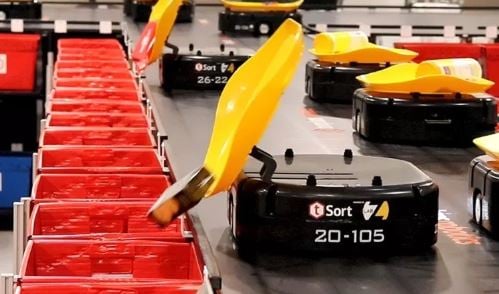
Tompkins Robotics adds new product to parcel sortation suite
Tompkins Robotics adds the t-Sort system to its sortation suite and has applications for both unit and parcel sortation. The company calls the t-Sort automated sortation system “revolutionary and innovative”, and says it consists of autonomous robots. It adds that the technology is “solving distribution and order fulfillment problems of leading retailers as they adapt to the realities of unichannel customer demands with unmatched flexibility and throughput”.
The t-Sort system uses independent robots that can go to any divert and induction station autonomously along the shortest path. Robots, chutes, and induction stations can be added modularly at any time with no interruption to operations. Additionally, robots can be added for peak seasons and taken out of service when not needed. The t-Sort Plus standard payload is up to 30 kg with a load size of up to 19” x 40”. The system has an alternative configuration for up to 55 kg. Induction is performed in a manual or automated mode. t-Sort Plus moves in any direction and is easily programmed to meet large item or parcel sorting needs. The robots run up to four hours on a five to eight minute charge, recharging automatically when needed.
Tompkins Robotics’ designs can accomplish volumes ranging from a million units a day to a few thousand an hour in both large and small sites. The applications for this technology are broad and include eCommerce fulfillment, store replenishment, store-based fulfillment, returns, and parcel sortation.
The t-Sort system allows for lower investment, shorter lead times, faster implementation, and reduced space and labor. The system enhances fulfillment at the store and consumer level through its unique features. It facilitates retailers and supply chain operators to have a quickly deployed, mobile, and flexible solution for the ever-changing landscape and requirements of today’s marketplace. Tompkins Robotics continues to help further evolve supply chain logistics automation, improving the efficiency of logistics operations.









